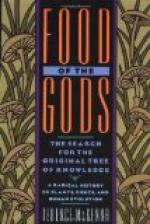Besides these combinations of cocoa with starch, sugar, etc., and cocoa treated with alkali, there are now found on the market mixtures of cocoa with such substances as kola, malt, hops, etc., sold under strange-sounding names, reminding one of the many mixtures that are made up as medicines rather than food. While the substances thus incorporated are of value in their place, they possess no virtues which are absent from the pure cocoa, and cannot be in any way considered an improvement of cocoa as food. The sooner this practice of drug taking under cover of diet comes to an end the better it will be for the national health.
Formerly Venetian red, umber, peroxide of iron, and even brick-dust, were employed to produce a cheaper article, but modern science and legislation combined have rendered such practices almost impossible. As early as the reign of George III. an Act[8] was passed, providing that, “if any article made to resemble cocoa shall be found in the possession of any dealer, under the name of ‘American cocoa’ or ‘English cocoa,’ or any other name of cocoa, it shall be forfeited, and the dealer shall forfeit L100.” Yet this Act was allowed to become so much a dead letter that in 1851 the Lancet published the analysis of fifty-six preparations sold as “cocoa,” of which only eight were free from adulteration. In some of the “soluble cocoas,” the adulteration was as high as 65 per cent., potato starch in one case forming 50 per cent. of the sample. The majority of the samples were found to be coloured with mineral or earthy pigments, and specimens treated with red lead are on exhibition at South Kensington.
The inclusion of the husk or shell in some of the cheaper forms of chocolate is another reprehensible practice (strongly condemned), as they do not possess the qualities for which the kernel or nib is so highly prized. To prevent this practice it was enacted in 1770 that the shells or husks should be seized or destroyed, and the officer seizing them rewarded up to 20s. per hundredweight. From these a light, but not unpalatable, table decoction is still prepared in Ireland and elsewhere, under the designation of “miserables.”
Among other beverages which have from time to time been produced from the cacao was a fermented drink much in vogue at the Mexican Court, to which it appears from the accounts of the conquest that Montezuma was addicted, as “after the hot dishes (300 in number) had been removed, every now and then was handed to him a golden pitcher filled with a kind of liquor made from cacao, which is very exciting.” One variety, called zaca, drunk by the Itzas, consisted of cocoa mixed with a fermented liquor prepared from maize; but a more harmless invention was a drink composed of cocoa-butter and maize.
[Illustration—Black and White Photgraph: How the Cacao Grows. (Showing Leaf, Flower, and Fruit.)]
There remain three forms in which pure cocoa may be prepared as a beverage:




